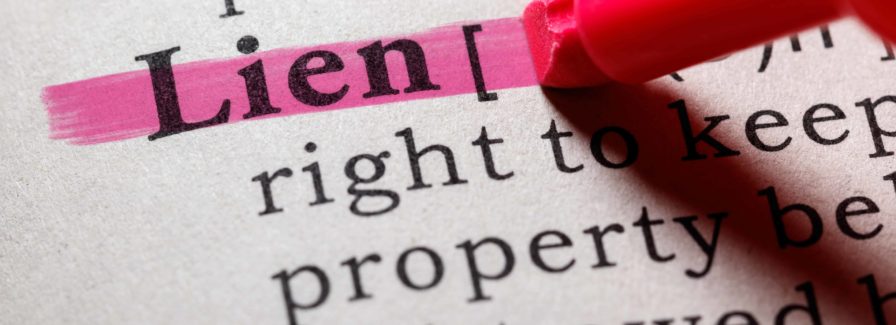
Posted on April 4, 2022 by Duval Home Buyers in Sellers
So You Want to Sell a House With Liens on it.
Selling a home with liens in Jacksonville, FL can be a difficult and daunting process. Liens encumber property and cloud title, making it difficult if not impossible to sell your home without resolving them. It’s important to understand what a lien is, what kind of liens might be attached to your home, and what solutions are available to help you sell your liened property in Jacksonville, Florida.
What is a lien?
The dictionary definition for a lien is: “A right to keep possession of property belonging to another person until a debt owned by that person is discharged.” But what does that really mean when it comes to your home or property?
In short, a lien is a monetary obligation or debt attached to a piece of real property such as a home, mobile home, condominium, or even vacant land.
Most title insurers and closers, who facilitate the legal and safe sale of real property, require that liens be satisfied before they will underwrite title insurance on the transaction. This means that you won’t be able to safely and legally sell a piece of real property you own, until it is free and clear of all liens.
Types of Liens
Liens come in many forms, and not all liens are created alike. Some are very common such as mortgage liens, others are rare and difficult to handle, such as demolition liens and nuisance liens.
-
Mortgage Liens
Many homeowners don’t realize that their mortgage is actually the first and largest lien on their house. When you apply for a loan and sign a mortgage, the mortgagee, typically your bank or credit union, places a lien upon your house for the mortgage balance. That way if you don’t pay, they have the right to take your house as collateral for the debt you owe.
Mortgages are commonly considered the First Priority Lien, which we will cover in more depth below, but on rare occasions some homeowners take out second and even third mortgages against the equity in their homes, and each one of these liens must be fully paid or “satisfied” before a home can be sold.
-
Nuisance Liens
Nuisance liens are liens placed on a property by a city division, usually called a municipal code division, in an effort to combat property blight. Property blight is the term used for properties and homes whose condition disrupts the quiet enjoyment of other homeowners, and often negatively affects nearby property values.
Examples of blight might include things such as: tall grass, yard debris, broken windows, abandoned vehicles, tarped roofs, or excess garbage.
These liens can sometimes be reduced by agreements or “abatements” with whatever city department first placed the lien against the home. These “abatement agreements” usually involve a fine or fee, along with the promise that the homeowner will return the property to compliance.
Many municipalities, including the city of Jacksonville, FL have taken a hard stance against property blight. Jacksonville is quick to attach a nuisance lien against an offending home.
-
Demolition Liens
Sometimes a property is in such poor condition that the city has no choice but to condemn a property for safety reasons. A condemned property is one that is no longer considered safe to enter or inhabit.
After a period of time, a city may demolish the house and lien the property for the cost of the demolition.
Typically a demolition lien is also accompanied by a number of previous nuisance liens such as in common for Jacksonville liens.
-
Mechanic’s Liens
A mechanics lien is a lien placed by a contractor or worker such as a roofer who has done work on your house, but hasn’t been paid for the work completed. The contractor places a lien for the debt against your house and is able to sue you to enforce the lien. If you are unable to pay the debt, the contractor may be able to force you to sell the property to satisfy what you owe.
-
IRS Liens
An IRS lien is a tax lien that is placed against a piece of property when there are back taxes that haven’t been paid to the federal government. Typically these unpaid taxes are income taxes and capital gains taxes.
In many cases the IRS elects to garnish, or take a proportion of your wages to pay the unpaid taxes, but in rare circumstances they may force the sale of a property, taking their share of the proceeds once the property is sold.
-
Property Tax Liens
Property tax liens are placed against a property for prolonged failure to pay state and municipal property taxes. In Florida, the state will first sell a tax lien certificate, in which a third party purchases and pays your delinquent taxes for the promise of interest on the unpaid balance. Each year you fail to pay, the interest fee will increase.
If after two years the property taxes have still not been paid, the holder of the tax certificate can request the property to be sold at a tax deed auction. At a tax deed auction the deed, or title to the property is sold to satisfy the property tax bills. The tax certificate holder is paid the amount owed plus interest, and the property owner is then able to claim any funds that remain once all liens are satisfied.
-
Judgment Liens
A judgment lien is a type of lien in which an unsecured creditor, such as a hospital or credit card company, files a lien against a property for unpaid debt.
First the creditor must file for, and win a lawsuit allowing them to lien the property. The lien remains with the property and must be paid off prior to or using the proceeds from a sale for the sale to be completed.
-
Child Support Liens
A child support lien is a lien placed upon a property by the courts for failure to pay court mandated child support.
Like a judgment lien, a home cannot be sold while liens attached to the home remain. Either the proceeds of the sale must be used to pay the back child support plus court mandated interest, or the lien must be paid prior to selling the home.
Paying off a lien yourself
Sometimes it is possible for a property owner to pay or “satisfy” a lien themselves. This will clear the title and allow the home to be freely sold, with the homeowner keeping all of the proceeds from the sale.
However mortgage liens, or nuisance and demolition liens may be too costly and cumbersome for many homeowners to manage. In these situations homeowners face losing their property to foreclosure or other legal proceedings. However, it may be possible for these home owners to sell their homes with the liens attached to specific types of home buyers.
How to sell a property with liens attached
A property with liens attached can be sold if the new buyer is willing to pay those liens. Many times the amount of the attached liens may be worth more than the property itself. A good investor will be able to discuss some of the remedies, such as lien abatement which might be available in those situations.
If the liens are low enough, a trusted cash buyer may make a cash offer on the property, and pay the liens off themselves so that you can earn a profit on the sale, while removing the risk of losing the home outright.
If you have a nuisance lien in Jacksonville FL or any other type of lien encumbering your property, and you want to discuss your selling options, just fill out a quick form and our team of professional home buyers will be happy to present an offer and go over your options.
